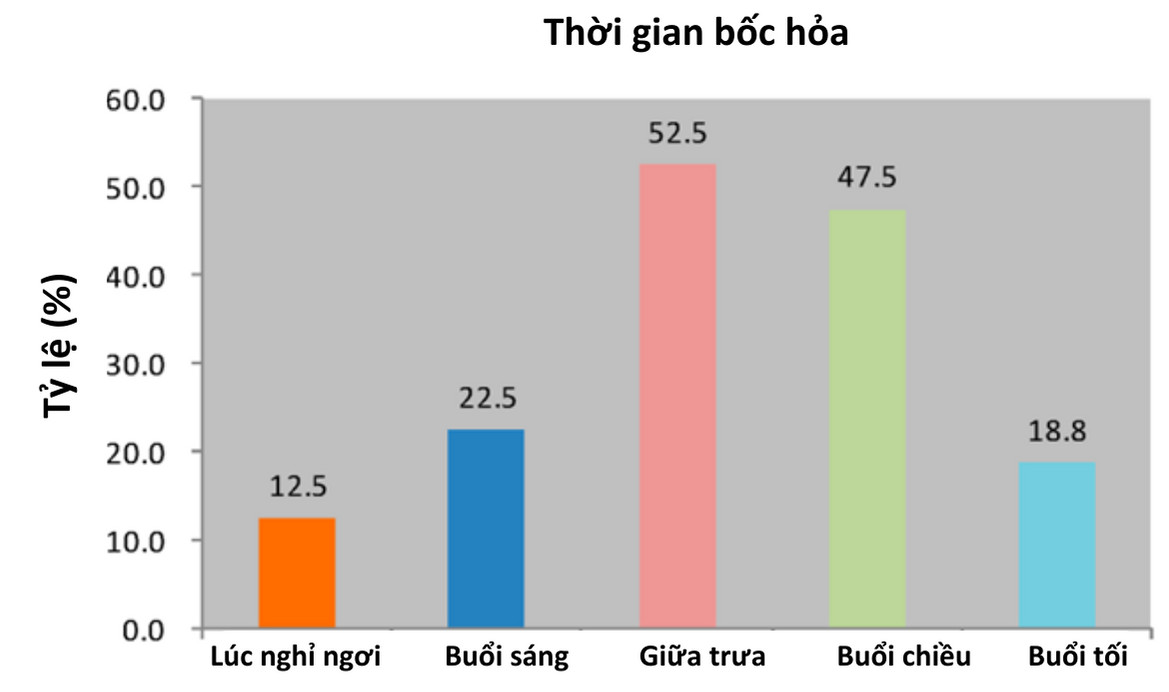
Hot flashes - a condition that affects up to 85% women between the ages of 45 and 60, so people often think hot flashes only occur during premenopause and menopause. But in fact, it is a myth that hot flashes also affect 75% pregnant women, especially in the second and third trimesters. Up to 90% women reported having hot flashes at least once in the weeks after giving birth. This article will help readers better understand why hot flashes also occur in pregnant women and postpartum women and are not simply menopausal hot flashes.
Hot flashes are defined as a sudden rush of heat that floods the face, head, and neck in just a few seconds and disappears soon after. They are often accompanied by temporary blushing, sweating, and may be accompanied by chills. What makes hot flashes so troublesome and uncomfortable is that they can flare up at any time, often without warning, and usually go away quickly. Hot flashes often occur during the day, the highest incidence is at noon (53.5%) and afternoon (47.5%), but hot flashes can also occur at night. When occurring during the day, hot flashes often make women more irritable, more difficult to control their emotions, and can affect life and work.

Although nocturnal hot flashes occur less frequently (18.8%), when they occur at night, women often wake up in the middle of the night, affecting sleep quality.
How often is hot flashes normal?
When women have hot flashes, they often worry: I don't know if the situation I'm experiencing is normal? Is the frequency of my hot flashes too frequent? Below is some data from studies around the world for women to refer to:
Cause of hot flashes
Understanding what causes hot flashes provides the key to knowing how to prevent and treat them. Although the exact causes of hot flashes are complex and the mechanisms behind them are not completely understood, most doctors and researchers agree that hormonal changes are to blame. main cause of hot flashes. In addition to these common hormonal causes, in rarer cases, other factors and medical conditions can cause hot flashes. Certain pre-existing medical conditions and lifestyle choices can also increase a woman's risk.
Hormonal changes
Hormones (also called hormones) are chemical transmitters that control every organ in the body. When fluctuations occur, the organs do not receive the correct signals to function fully, so hormonal disorders occur. The exact way hormones interact with certain parts of the body, especially the brain, is not completely understood. However, there is a clear connection between fluctuations in female sex hormones (estrogen, progesterone) and the hypothalamus - a part of the brain that acts as the body's "internal thermostat".
Scientists have discovered that an imbalance in estrogen and progesterone levels, especially a sudden lack of estrogen, can confuse women's hypothalamus and make them believe that their body is overheating. hot. As a result, this part of the brain quickly reacts by sending commands throughout the body to cool down. This causes the blood vessels to dilate or dilate and as a result large amounts of sweat are secreted.
This is why many women experience hot flashes during periods of significant hormonal imbalance: puberty, premenstrual syndrome, menstruation, pregnancy, postpartum, and menopause. If estrogen and progesterone levels are not well regulated, women may experience hot flashes as well as other psychological and physiological disorders.
Other less common causes of hot flashes
While hormonal imbalance is the main cause of hot flashes in women's lives, experts also point out that disturbances in the way the body senses heat can be caused by underlying conditions. Other less common causes include: thyroid dysfunction, idiopathic hyperhidrosis, infection, hypoglycemia...
In addition to the reasons mentioned above, there are some weaknesses Risk factors and factors that can trigger hot flashes include hot surroundings, tight clothing, hot spicy foods, stimulants such as caffeine, alcohol, smoking, etc.

What changes occur in the body when hot flashes occur?
Because each woman experiences temperature and weather changes differently, she also experiences hot flashes differently and finds them affecting her life in different ways. However, there are some common symptoms that women will experience when hot flashes occur:
In general, hot flashes often occur during periods of important hormonal changes in women, and the symptoms and frequency of hot flashes can vary from person to person. Understanding the causes and risk factors for hot flashes will help fix understand the effects of hot flashes on women's lives.
If you have any questions, please pick up the phone and contact us immediatelyHotline 0936.236.283or leave a questionherefor answers and advice from Atlantic Medical's pharmacists
Wishing you and your family good health and quality life!

Business Registration Certificate No. 0109881571 issued by Hanoi Department of Planning and Investment on January 10, 2022
© 2023 Copyright by Atlantic Medical All rights reserved.